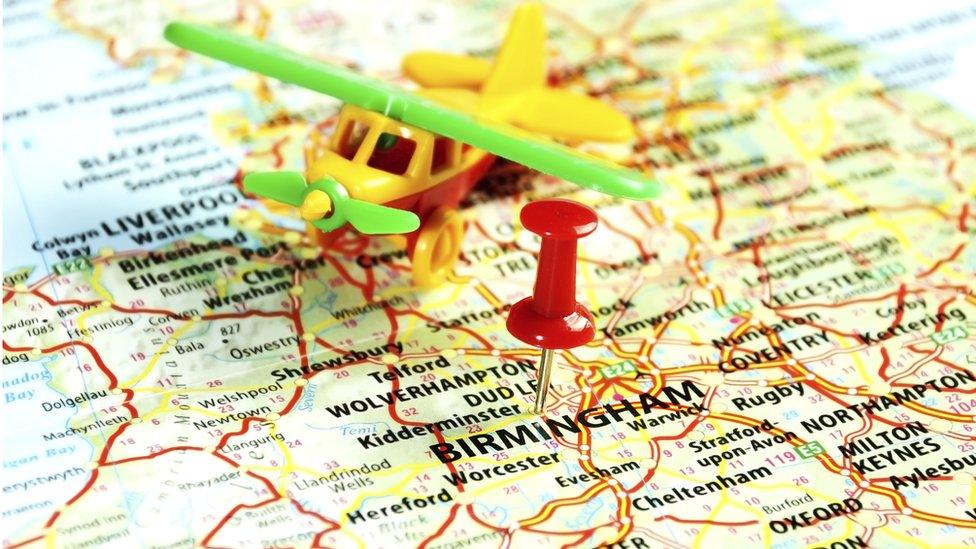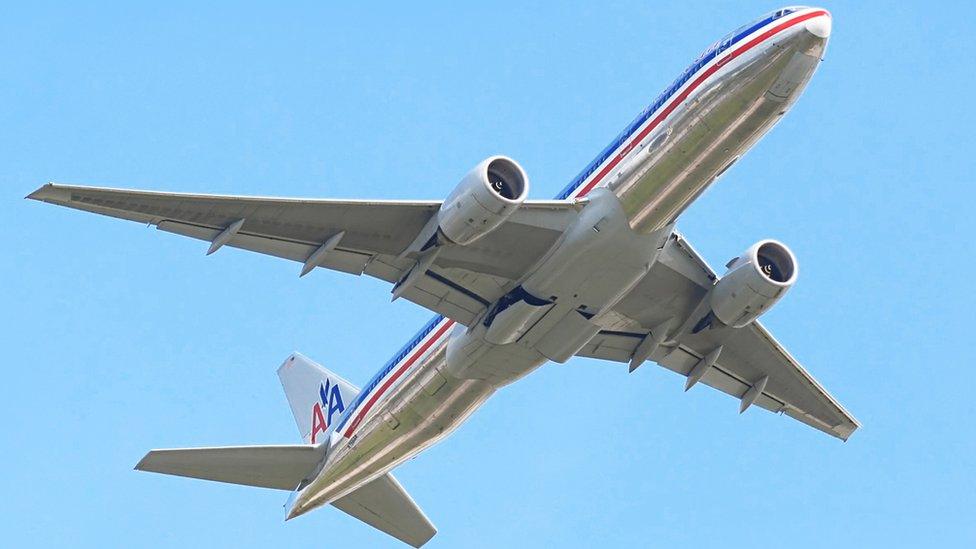Midlands in for the long haul debate on air duty
- Published
- comments
'A one-size-fits-all tax'

Devolved powers to cut air passenger duty at West Midlands airports were high on the wish-lists of people who will run the new combined authority
That's how air passenger duty (APD) was widely regarded when it was introduced 20 years ago. Inevitably, it's increased steadily since then and to this day it has the look of a very blunt instrument.
It adds a flat tax of £13 per head on short haul flights up to 2,000 miles. But for long-haul journeys, including transatlantic flights, it rises sharply to £71 each. Over the past year, George Osborne has eased the burden on families by exempting children under 12 travelling in economy from last May and those under 16, from this coming March.
Now Mr Osborne's self-proclaimed devolution revolution is triggering demands from local decision-makers that he should go further still. They see APD as one of the touchstone issues in the negotiations between the government and the West Midlands Combined Authority: new devolved powers to reduce APD were high on their original draft wish-lists in the preliminary negotiations leading to last November's devolution agreement.
Competitive disadvantage

Dudley North Labour MP Ian Austin wants devolved English regions to have the same powers as Scotland and Wales to cut APD
The former West Midlands minister, the Labour MP for Dudley North Ian Austin, is taking the campaign to Westminster. He points out the devolved governments in Scotland and Wales already plan to use their tax-varying powers to cut APD on flights from their airports, "putting regional airports in England at a competitive disadvantage", he says. And so, by extension, are the businesses and leisure passengers on this side of Hadrian's Wall and Offa's Dyke.
The counter-arguments facing him are as powerful as ever.
Even after the chancellor's relaxations in APD, it is still worth more than £3bn a year to the Exchequer. Mr Osborne's tax-cutting rhetoric can only go so far while he remains determined to "repair the nation's finances". And then there is the wide array of 'green' arguments against aviation: why should there be any further special favours, given the environmental costs of an industry which is taxed relatively leniently on the vast but finite energy resources it consumes?
Going the distance

American Airlines is one of the international carriers that run long-haul flights to and from Birmingham
This debate has been sharpened by the government's announcement, just before Christmas, that it was to delay still further the long-awaited decision over a new runway for south-east England until the summer at the earliest. While Londoners obsess with Heathrow or Gatwick and how the various options play into the capital's mayoral election and into the machinations of internal Cabinet politics, outside the Westminster Village, Birmingham Airport has been steadily building up its own very significant long-haul route network.
Air India; American; Emirates; Icelandair; Pakistan International; United and, in two months' time, Qatar Airways, are among the roll call of major global airlines flying direct from Birmingham's newly-extended "full length" runway. There is also a significant presence of major European airlines feeding passengers to London's main rival European 'hub' airports: Air France; KLM; Lufthansa and, coming soon, Iberia.
And remember, it is the long-haul flights that attract the highest rate of air passenger duty. Birmingham's airport managers say a relaxation in APD would enable it to grow its global links still further, to claw back some of the millions of Midlanders who currently head south for their long-haul flights. Five years ago, when United Airlines threatened to pull out of their service between Belfast and New York Newark, Mr Osborne scrapped APD on transatlantic flights from Northern Ireland altogether. United continue to serve Belfast, to the benefit of the province's economy and the relief, no doubt, of its business community and leisure travellers alike.
Now Birmingham Airport's Chief Executive Paul Kehoe says it is more important than ever to "plug every region into global business opportunities" during the 10 to 15 years it will take to build a new South East runway.
"This fresh delay is making a new South East runway look more distant than ever. It is therefore vital that the government comes forward with plans to support the UK's network of long-haul airports now, to relieve pressure on the South East."
Should ministers heed his advice?
This will be among our talking points on this weekend's first Sunday Politics Midlands of the new year. Joining me in the studio, the MP whose constituency includes Birmingham Airport, Julian Knight, Conservative MP for Solihull; and the Labour MP for Walsall South, Valerie Vaz.
And I hope you will join me too, in our usual 11.00 slot this Sunday, 10 January 2016 on BBC One.